QuestionHi,
I have a cat that is due anytime and she has started to bleed, it is a very fluidy blood is this normal?
AnswerCheryl,
You may be seeing what's called bloody show, but keep an eye on things, if there seems to be more blood or the blood tinged fluids keep coming then you will need to take this gal to the vet to be assessed. If your cat begins to strain and hasn't produced a kitten within an hour there's a good chance that she will need to be seen by a vet to determine whether or not she can deliver her family vaginally. If the momma cat has greenish discharge from her vagina she must be immediately taken to the vet as this can potentially indicate premature separation of the placenta. If you notice that mom seems to be anxious or walking with a stiff gait it is quite likely that she has a condition called eclampsia which means that she is deficient in calcium and or magnesium. This condition can cause seizures, tremors and death so it must be treated immediately once you recognize the symptoms.
Most female cats don't lose much blood during or after birth and what any blood that they do lose they clean away fairly quickly. My usual recommendation is that if a cat is contracting well and straining for more than 1 hour without delivering a kitten a vet needs to be involved. Cat labor and delivery isn't the same as a woman having a child. Labor and childbirth in people can last for 24+ hours, women do experience blood loss after giving birth and everything is essentially normal. In most queens labor and delivery of a litter of kittens is something that usually happens within the space of a couple of hours during the night. Most times the litter has been dried off and cleaned up by mom by the time that you wake in the morning. Domestic cats are essentially the same, they have evolved to have relatively quick labors, most have uneventful deliveries and blood loss is minimal to avoid attracting the attention of predators.
It's a good idea for mom and her litter to be in the least stressful environment possible. It's a good idea to place mom and any kittens that have been born in a quiet, dimly lit room with food, water, a comfortable place for the new family to sleep (a cardboard box lined with a blanket or old towels works fine, but be sure to change the bedding if it becomes soiled). Be sure that you don't forget to include a litter box so that mom is able to use the toilet without having the kittens out of her sight, be sure to place the litter as far as possible from the food dishes as cats don't normally like to eat where they use the toilet. Giving mom her own space to deliver her babies will most likely help to decrease her stress level, especially if you have small children in your household. Newborn kittens are extremely vulnerable to contracting viral and bacterial infections and it is best to have anyone handling mom or her new babies wash their hands thoroughly with hot water and soap to reduce the risk of infection to mom or the kittens.
Mom and her kittens should be given as much good quality kitten food as they would like so that she can produce milk to meet the needs of her rapidly growing litter. Around 5-7 weeks of age the kittens will most likely begin eating solid food as their mother begins to wean them. It's extremely important to make sure that mom and her little family have as much clean, fresh water as they would like every day to ensure that everyone remains properly hydrated. Mom and her offspring will need two litter boxes, one kitten sized along with an adult sized litter box will work nicely. When the kittens are old enough they will most likely copy their mother in order to learn how to use the litter box. If you don't happen to have a kitten sized litter box on hand you can use a disposable aluminum lasagna pan and discard it when it's no longer needed. In my experience it's best to use an unscented clumping kitty litter to fill the litter boxes. Clumping kitty litter is made from a variety of materials today and in my experience it doesn't really matter what the litter is made of so long as it's unscented because some cats are very sensitive to the perfumes and dyes commonly found in scented litter which can lead to litter box problems down the road.
I normally suggest that pregnant queens be isolated from other cats in a household about two weeks or so prior to delivering their litter. Nursing moms should be allowed to care for their litter in a safe environment, which in a multiple cat household or a household with young children or several busy adults means behind a closed door. There are a few reasons for this recommendation; pregnant or nursing queens are more easily stressed which can result in aggressive behavior meant to protect the kittens that is often directed towards other cats in the home. Newborn/nursing kittens are more susceptible to viral and bacterial infections than older kittens/cats simply because the protective antibodies that are passed to them through their mother's milk aren't actually permanent. In fact the highest concentration of antibodies that the kittens will receive from their mother's milk is found in the colostrum which the kittens get immediately after birth and for the first 24-48 hours after birth.
As the kittens get a bit older socialization becomes very important. You and your family members can help the kittens learn how to interact nicely with people by taking the time to handle each of the kittens gently. It's a good idea to play with mom during the time you are spending with the kittens because she may become insecure if you only pay attention to the kittens. The kittens are at a crucial stage of their development and must be gently handled, taught to play with toys and properly socialized starting within a the first week of life. Well socialized kittens will be more likely to get and keep a loving permanent home. I typically recommend that kittens be allowed to stay with their mother and siblings until they are about 10-12 weeks old. The kittens can be re-homed at 10-12 weeks of age if you wish since they will be fully weaned by that time. Kittens who are allowed to stay with their mother for the first 10-12 weeks of their lives have a chance to begin the process of socialization.
Cats are predators and as such they have specific ways of teaching their young to understand limits. Sometimes these disciplinary sessions can look a little excessive because mother cats are strict with their young, in most cases it isn't necessary for human beings to intervene when a queen is teaching her kittens. While the kittens play amongst themselves they have the opportunity to learn important skills like bite inhibition which essentially means that they bite each other and get bitten by each other which allows them to learn that being bitten hurts. Siblings also get the chance to practice vital skills like hunting, stalking, pouncing on prey and even defending themselves. It's been my experience that kittens who are allowed to remain with their mother and siblings for 10-12 weeks tend to be much stronger and well adjusted than kittens that have been re-homed around 5-8 weeks of age. It's much nicer for the kitten and the prospective owner if the kitten is happier, more confident and better able to bond. Kittens that are separated from their mother when they're younger than 8 weeks of age can be less confident and comfortable in new situations. When a kitten is taken from mom at 6 weeks of age or younger it isn't uncommon for them to develop self soothing behaviors like sucking on blankets, stuffed toys, other pets in the home and even their human caregiver's hands, ears, fingers, etc.
Given that there is a very serious pet overpopulation issue worldwide the decision to breed a pet must be carefully considered. Countless numbers of healthy, adoptable cats are destroyed in animal shelters every year worldwide simply because there isn't enough space to house the millions of cats and kittens that are admitted to these institutions and quite honestly time is a factor, shelters can't hold onto animals indefinitely. In North America only 3% of cats/kittens admitted to animal shelters are reclaimed by their owners which seems to indicate that people generally view cats as "disposable pets". Surgical sterilization provides a number of health and behavioral benefits beyond the obvious asset: population control. Most veterinarians won't sterilize a nursing queen until she has weaned her kittens and her milk supply has dried up somewhat which is usually about two weeks or so after the kittens are fully weaned. Cats who haven't been sterilized are far more likely to have nasty territorial disputes with other cats in the area.
Many pet guardians are concerned about potential risks and drawbacks of spaying or neutering. It's a common myth that spaying or neutering your cat will make him/her fat and lazy. Surgically sterilizing your cat/kitten won't change his/her personality, nor will it cause them to gain weight. Many people believe that surgically altering their cat/kitten is unnatural or even dangerous. Allowing an intact cat to cycle repeatedly while preventing the cats from mating is unnatural. Cats that haven't been spayed/neutered are hard wired to reproduce much the same as any other animal. While no surgery is completely without risk spay/neuter procedures are very routine, cats are given an injection of long acting pain medication prior to their surgery to minimize discomfort and the risks related to anesthesia have been substantially reduced by using safer human anesthetic agents. Cats being spayed or neutered are constantly monitored by a veterinary technician to ensure that their vital signs stay in the normal range.
Cats that have been sterilized tend to be far less likely to wander, fight, and the caterwauling and howling to advertise their availability to mate is eliminated. Spayed and neutered cats also enjoy a number of health benefits including a reduced incidence of mammary infections or tumors and the risk of developing prostate, ovarian, uterine or testicular cancers is virtually eliminated. Ultimately spaying and neutering prevents unwanted litters which in turn saves millions of lives every year. Spaying or neutering your cats/kittens is a life saving decision.

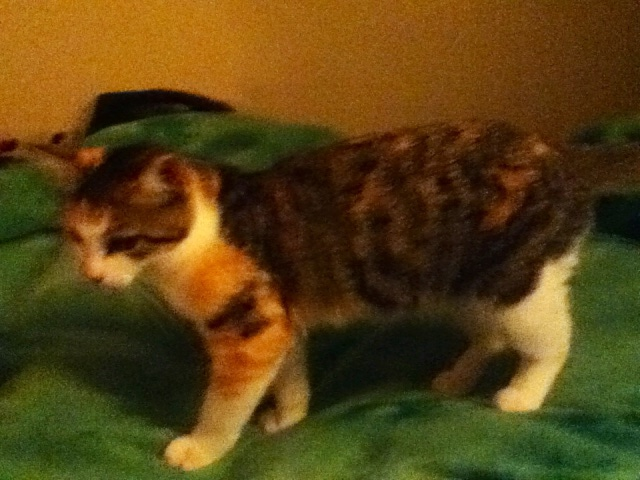 Short Tailed Manx Kitten
Question
Una Mica Una Mica
Hello,
I go
Short Tailed Manx Kitten
Question
Una Mica Una Mica
Hello,
I go
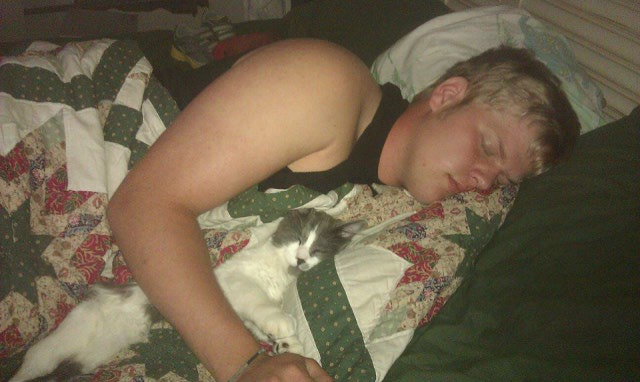 Sick kitty
Question
Kelso
Hi, I rescued a feral cat who was
Sick kitty
Question
Kelso
Hi, I rescued a feral cat who was
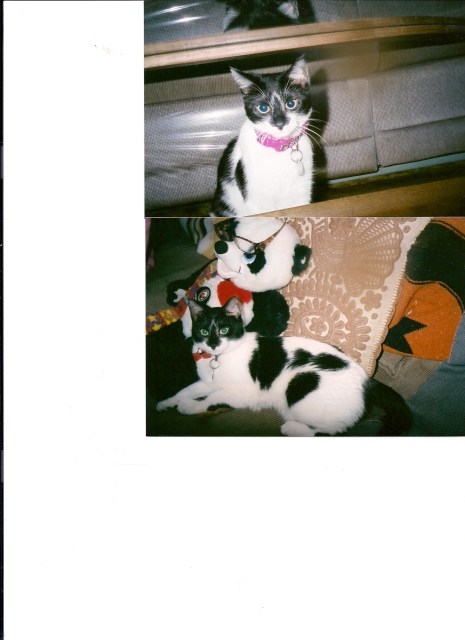 Kate
Question
CREAM PUFF
Hello !
About 2 years ago I
Kate
Question
CREAM PUFF
Hello !
About 2 years ago I
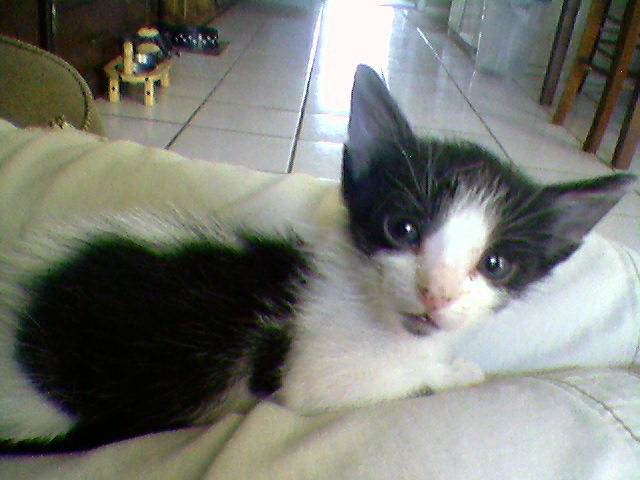 Orphan Kitten Care
Question
My new baby
Hello! Okay, Ill try to sho
Orphan Kitten Care
Question
My new baby
Hello! Okay, Ill try to sho
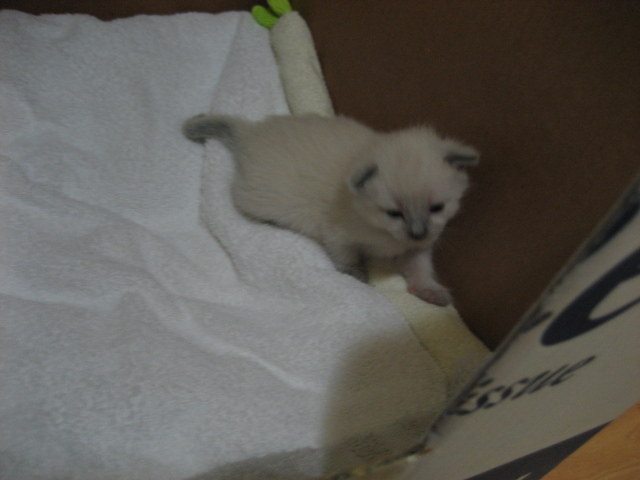 is my kitten blue or blue cream point?
Question
polar bear
hi Jessica, our mommy cat is a blac
is my kitten blue or blue cream point?
Question
polar bear
hi Jessica, our mommy cat is a blac